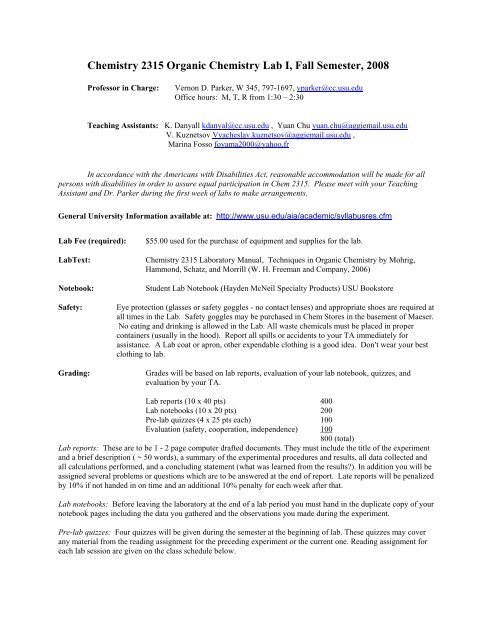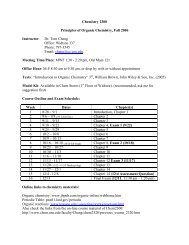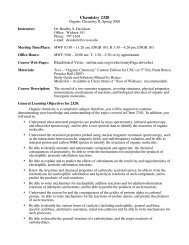CHEM 2315 - Organic Chemistry Lab I
CHEM 2315 - Organic Chemistry Lab I
CHEM 2315 - Organic Chemistry Lab I
Create successful ePaper yourself
Turn your PDF publications into a flip-book with our unique Google optimized e-Paper software.
<strong>Chemistry</strong> <strong>2315</strong> <strong>Organic</strong> <strong>Chemistry</strong> <strong>Lab</strong> I, Fall Semester, 2008<br />
Professor in Charge:<br />
Vernon D. Parker, W 345, 797-1697, vparker@cc.usu.edu<br />
Office hours: M, T, R from 1:30 – 2:30<br />
Teaching Assistants: K. Danyall kdanyal@cc.usu.edu , Yuan Chu yuan.chu@aggiemail.usu.edu<br />
V. Kuznetsov Vyacheslav.kuznetsov@aggiemail.usu.edu ,<br />
Marina Fosso foyama2000@yahoo.fr<br />
In accordance with the Americans with Disabilities Act, reasonable accommodation will be made for all<br />
persons with disabilities in order to assure equal participation in Chem <strong>2315</strong>. Please meet with your Teaching<br />
Assistant and Dr. Parker during the first week of labs to make arrangements.<br />
General University Information available at: http://www.usu.edu/aia/academic/syllabusres.cfm<br />
<strong>Lab</strong> Fee (required):<br />
<strong>Lab</strong>Text:<br />
Notebook:<br />
$55.00 used for the purchase of equipment and supplies for the lab.<br />
<strong>Chemistry</strong> <strong>2315</strong> <strong>Lab</strong>oratory Manual, Techniques in <strong>Organic</strong> <strong>Chemistry</strong> by Mohrig,<br />
Hammond, Schatz, and Morrill (W. H. Freeman and Company, 2006)<br />
Student <strong>Lab</strong> Notebook (Hayden McNeil Specialty Products) USU Bookstore<br />
Safety:<br />
Grading:<br />
Eye protection (glasses or safety goggles - no contact lenses) and appropriate shoes are required at<br />
all times in the <strong>Lab</strong>. Safety goggles may be purchased in Chem Stores in the basement of Maeser.<br />
No eating and drinking is allowed in the <strong>Lab</strong>. All waste chemicals must be placed in proper<br />
containers (usually in the hood). Report all spills or accidents to your TA immediately for<br />
assistance. A <strong>Lab</strong> coat or apron, other expendable clothing is a good idea. Don=t wear your best<br />
clothing to lab.<br />
Grades will be based on lab reports, evaluation of your lab notebook, quizzes, and<br />
evaluation by your TA.<br />
<strong>Lab</strong> reports (10 x 40 pts) 400<br />
<strong>Lab</strong> notebooks (10 x 20 pts) 200<br />
Pre-lab quizzes (4 x 25 pts each) 100<br />
Evaluation (safety, cooperation, independence) 100<br />
800 (total)<br />
<strong>Lab</strong> reports: These are to be 1 - 2 page computer drafted documents. They must include the title of the experiment<br />
and a brief description ( ~ 50 words), a summary of the experimental procedures and results, all data collected and<br />
all calculations performed, and a concluding statement (what was learned from the results?). In addition you will be<br />
assigned several problems or questions which are to be answered at the end of report. Late reports will be penalized<br />
by 10% if not handed in on time and an additional 10% penalty for each week after that.<br />
<strong>Lab</strong> notebooks: Before leaving the laboratory at the end of a lab period you must hand in the duplicate copy of your<br />
notebook pages including the data you gathered and the observations you made during the experiment.<br />
Pre-lab quizzes: Four quizzes will be given during the semester at the beginning of lab. These quizzes may cover<br />
any material from the reading assignment for the preceding experiment or the current one. Reading assignment for<br />
each lab session are given on the class schedule below.
Evaluation: You will be evaluated by your TA on your preparedness, your adherence to safety rules, your<br />
cooperativeness, and your ability to work efficiently.<br />
A grade of 90% is guaranteed a letter grade of A- and 95% an A.<br />
Make-up policy: Students who miss an experiment and furnish a valid excuse to the instructor may attend another<br />
section in the same week if space is available. The student must contact the TA of the section for<br />
the make-up lab before starting the experiment. Missing the second experiment will result in a<br />
grade of zero for that lab. Students missing more than two labs will receive a grade of F for the<br />
course.<br />
The <strong>Lab</strong>oratory Notebook<br />
A lab notebook is a permanent record of experiments carried out in the laboratory. Everyone who may be occupied<br />
in the scientific research must learn to keep a proper record of their experimental conditions and observations. In<br />
industrial laboratories this is of such importance that notebook pages are signed by the researcher and by a colleague<br />
who serves as a witness. The notebook serves as a legal document to establish claims of discovery.<br />
Your TA will be continually evaluating your notebook usage, both in the manner in which you enter data in the lab<br />
and in the copies which you hand in at the end of each lab period. The following guidelines should be followed:<br />
1) All entries must be in ink. NO PENCIL!<br />
2) Each notebook page must be dated as it is used.<br />
3) Notebook entries must not be erased or obliterated. Cross out erroneous entries with a single line and make<br />
the correct entry nearby.<br />
4) Data must be entered into your notebook directly as you gather it. Using scraps of paper for any records for<br />
later transfer to your notebook is unacceptable.<br />
General format: Before you come to the laboratory you should enter the following into your notebook to help you<br />
prepare for the experiment (and for a possible quiz!).<br />
1) The top of the first notebook page for each experiment should contain the title of the experiment. This should be<br />
followed by a brief statement of the purpose.<br />
2) Write balanced chemical equations showing the overall process you will perform.<br />
3) Write an experimental outline in sufficient detail so that you could do the experiment without referring to the<br />
textbook. One possible format for this is to draw a vertical line down the center of the page and write the<br />
experimental outline on the left side of the page and then enter your observations at different points of the<br />
experiment on the right side.<br />
Your TA will give you other specifics about how your notebook should be organized and maintained.
<strong>Chemistry</strong> <strong>2315</strong> (Fall 2008) - Experiments<br />
<strong>Lab</strong> Week Activities <strong>Lab</strong> Manual Time Period<br />
1 Check-In, Safety Discussion Experiment 1 9/2-9/08<br />
Fermentation of Sucrose<br />
Tuesday - Monday<br />
2 Distillation of Ethanol Experiment 2 9/09 – 9/15<br />
Tuesday - Monday<br />
3 Extraction of Caffeine from Tea Experiment 3 9/16 – 9/22<br />
Tuesday - Monday<br />
4 Thin-Layer and Column Chromotography Experiment 4 9/23 – 09/29<br />
Of Caffeine<br />
Tuesday - Monday<br />
5 Synthesis of Salicyclic Acid Experiment 5 9/30 – 10/6<br />
Tuesday - Monday<br />
6 Synthesis of Aspirin Experiment 6 10/7 – 10/13<br />
Tuesday - Monday<br />
7 Synthesis of Isopentyl Acetate Experiment 7 10/20 – 10/23<br />
Monday-Thursday<br />
8 Analysis of Isopenty Acetate Experiment 8 10/27 – 10/30<br />
Monday-Thursday<br />
9 Dehydration of 2-Methylcyclohexanol Experiment 9 11/3 – 11/6<br />
Monday-Thursday<br />
10 Synthesis and chemiluminescence of Luminol Experiment 10 11/10 – 11/13<br />
Monday-Thursday<br />
11 Stereochemistry of Br 2 Experiment 11 11/17 – 11/20<br />
Addition to trans-Cinnamic Acid<br />
Monday-Thursday<br />
12 Grignard Synthesis of Triphenylmethanol Experiment 12 12/01 – 12/04<br />
Monday-Thursday<br />
**Notice that lab checkout is in week 12 this semester due to new semester schedule.
















